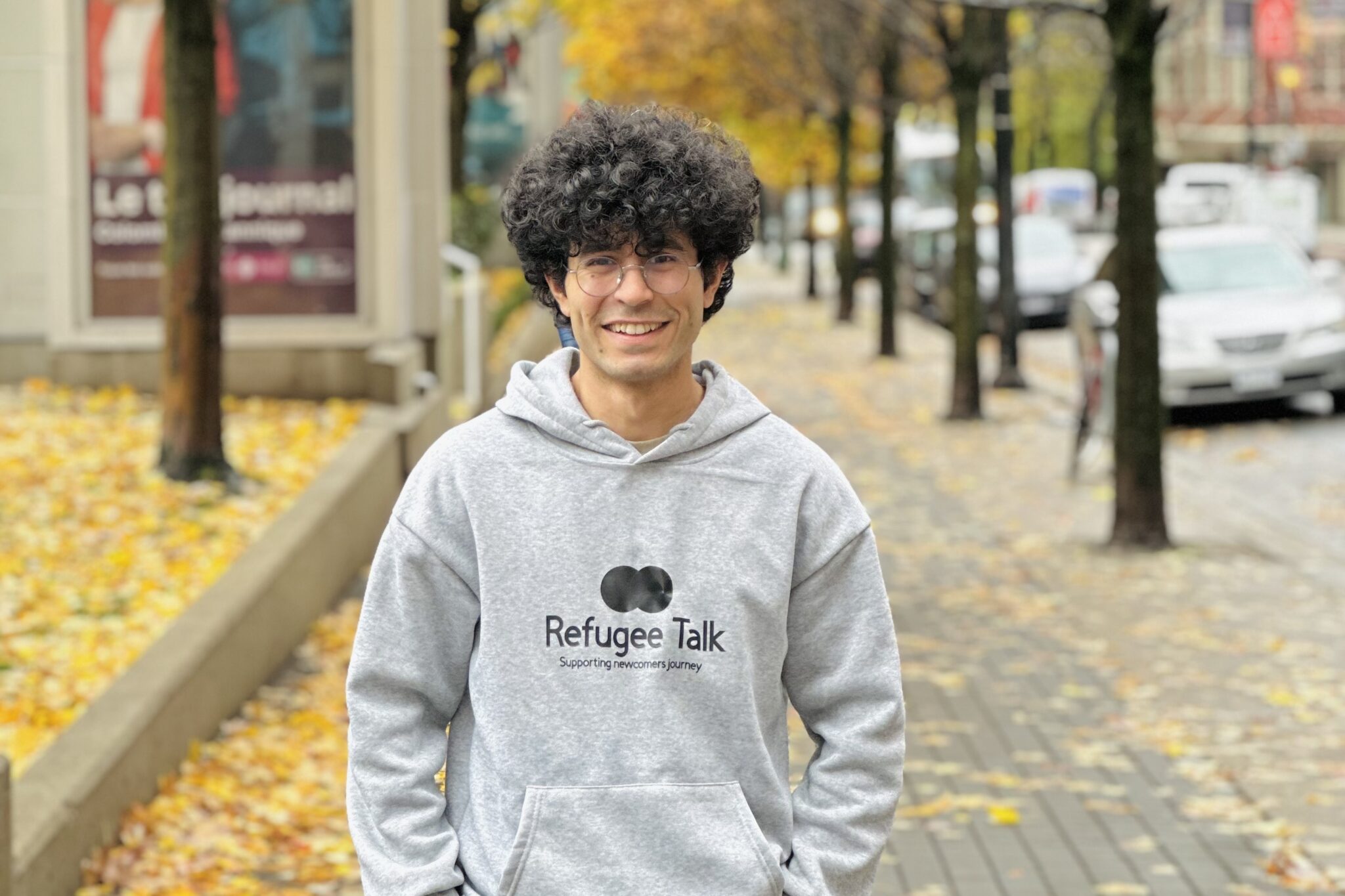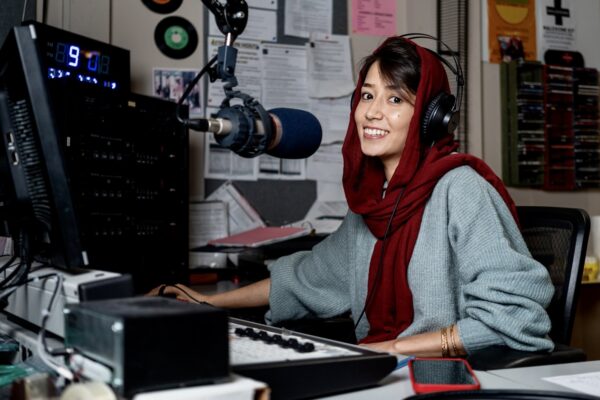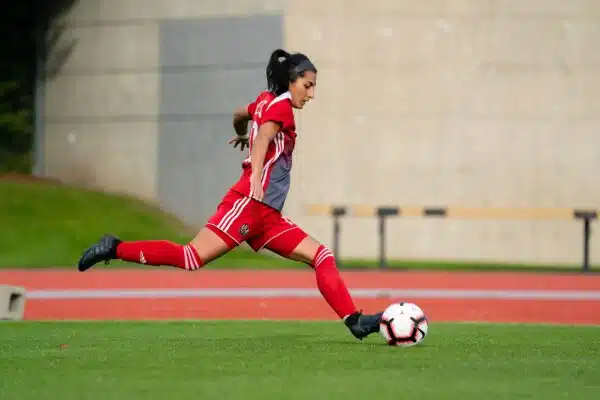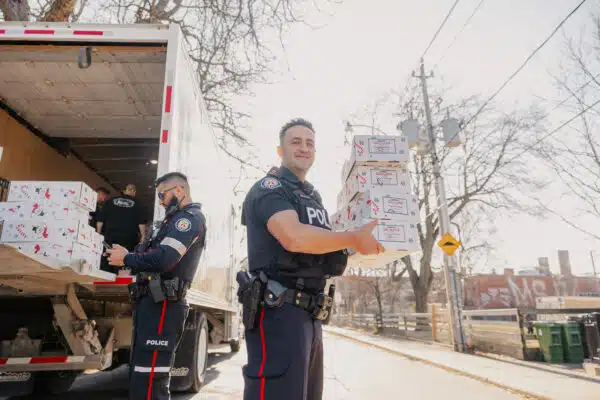
Milad, co-founder of Refugee Talk. © Milad Rajabi
From photographing displaced families in Afghanistan to becoming a refugee himself, Milad Rajabi has seen both sides of the story. Now in Canada, he is using his podcast Refugee Talk to amplify refugee voices and advocate for refugee-led change.
By Rafay Ahmed in Ottawa, Canada
Some of Milad Rajabi’s earliest memories are of trailing after his older sister, Farkhonda, into meetings of Parto, the magazine and cultural house she founded. Under her leadership, it became a wellspring for a new generation of women poets and activists across Afghanistan. Watching his sister and her peers use their own stories to champion women’s rights, Milad came to see the world as a collection of stories waiting to be told—and storytelling as a tool to change it.
Where Farkhonda wielded words, Milad found the camera. By his teens, he was a budding photojournalist, capturing everything from cultural festivals to political rallies. But it was in the outskirts of his hometown, Mazar-i-Sharif, among displaced families living in camps, that he found his true focus.
“I wanted to share moments of happiness, not just hardship. Mostly, I took pictures of people laughing, people enjoying the happy days,” Milad recalls.
In 2017, Farkhonda saved enough money to send Milad to university in India—his first time leaving Afghanistan. “Go see the world, Milad,” she urged him.
At 17, the experience proved transformative.
“I saw so many people of different cultures, different religions, different communities. And I realized I could do so much with my life.”
Motivated by this new sense of possibility, he began posting videos on social media about issues that mattered to him—from life as an international student to debates over social and political change.
“India changed something in me.”
After graduating, Milad knew he wanted to return home to Afghanistan, carrying with him a new perspective and a determination to make a difference. During the COVID-19 pandemic, he joined the Kindness Sharing Project—teaching English and distributing supplies in the same camps where he’d once taken photos.
Through it all, he continued to document the resilience of those living on the margins, his camera a constant companion, never imagining how closely their experiences would soon mirror his own.
Two years that felt like ten
By summer 2021, Mazar-i-Sharif was on edge. With the Taliban advancing across Afghanistan, Milad and his siblings—active in advocacy or humanitarian work—feared the worst.
“First the villages fell, then the towns. Of course the big cities would fall too.”
For Farkhonda, it was all too familiar. Years earlier, she had fled Afghanistan and rebuilt her life in Canada. Now, from half a world away, she called her younger brother day and night, urging him and the rest of the family to get out. Milad still hears her voice: “Milad, you have to do something. Milad, you must leave.”
Two weeks before the country fell, amid the chaos of desperate evacuations, Milad and his family secured visitor visas to Türkiye and boarded one of the last flights out of Afghanistan. But his father chose to stay behind. “He told us, ‘I don’t want to leave. I don’t want to abandon my country,’” Milad recalls.
In the final hours before their departure, ahead of the long drive to Kabul airport, the family worked frantically to protect what they could of the lives they were leaving behind—hiding books from their home library, personal writings, and academic medals and certificates under pillows and mattresses. It was part act of preservation, part attempt to shield their father, who stayed behind and would face whatever came next alone. He remained in Afghanistan for nearly two years before finally reuniting with his family in 2023.
In Türkiye relief gave way to uncertainty. Only after Afghanistan fell to the Taliban on August 15, 2021, were Milad and his family permitted to seek asylum and granted temporary status.
Still, life remained unstable. They moved frequently from one apartment to the other and faced hostility from neighbours. Milad took any job he could find—washing trucks, cleaning toilets—all while enduring discrimination for being an asylum seeker. “I kept thinking, ‘I have so much potential. Why am I here?’”
A turning point came when, by chance, he found an opportunity to help at a centre offering English classes for refugees. The work paid little, but it gave him purpose. A refugee himself, Milad poured his energy into helping others, and it reminded him of what he was capable of.
Still, he wanted to create something of his own, a place shaped by his vision of community. He rented a small room on the first floor of an old apartment complex and began transforming it. Handmade art covered the walls, colourful balloons hung from the ceiling, and rows of chairs stood ready for lessons. There, Milad taught English, read stories aloud, and encouraged the children to play and imagine a future beyond their circumstances. The space quickly became a home for their voices, a place where they could speak openly about their experiences and feel understood. He called it Refugee Talk.

Rows of chairs ready for a lesson at Refugee Talk in Türkiye. © Milad Rajabi
The space was open for more than a year, and in that time, dozens of youth passed through its doors. But then one day, a fight broke out between two students outside and police were called. The arrival of uniformed officers triggered unease in Milad, knowing how vulnerable refugees could be. While the situation resolved without incident, he feared deeply what could happen if this occurred again. And so, with great sadness, he closed Refugee Talk—feeling like another piece of his life was being taken away.
“In two years, I felt like I aged ten. The depression and anxiety I experienced in Türkiye …I wouldn’t wish it on my worst enemy.”
In the midst of this despair came the news that changed everything. At the Canadian embassy in Ankara, two years after arriving in Türkiye, Milad and his family learned that their application for resettlement to Canada had been approved. He will never forget the moment—the man who delivered the news, the surge of relief, and the feeling that his journey was finally understood.
“It was the happiest day of my life.”
The rebirth of Refugee Talk
For Milad, seeing the “Welcome to Canada” sign as he arrived at Vancouver’s airport brought an overwhelming sense of peace. For the first time in years, he had the space to look back on the road that had brought him here, from photographing displaced families in Mazar-i-Sharif to becoming a refugee himself. It left him with one conviction: “Only a refugee knows what another refugee needs. People need to hear our voices”
Determined to create a space for those voices, Milad began approaching refugees he met at community events, cultural gatherings, and even in day-to-day encounters, always starting with a smile and a simple question: “Hey, how are you? What’s your name?”
At first, he invited people to share their stories in short, heartfelt video clips on social media. But as the stories multiplied, so did his ambition. Within months, those conversations had evolved into full-length podcast episodes, and he named the project Refugee Talk, reviving the name of the centre he had created in Türkiye, now brought to life in a new country and in a new form.
On Refugee Talk, Milad’s guests come from every walk of life. In one episode an interpreter spoke about the vital role their work plays in helping refugees navigate unfamiliar systems. In an other, an Indigenous community leader shared what it means to build bridges between Indigenous histories of displacement and the experiences of newcomers.
Most guests, however, are refugees themselves, recounting the heartbreak of separation from loved ones, the resilience it takes to start over, and the rare moments of joy that still find their way in. One story Milad will never forget came from a guest who described crossing the sea from Türkiye to Greece in an overcrowded boat, each wave threatening to capsize them before they reached safety.
Reflecting on how far he has come, from poetry circles in Afghanistan to growing a media platform that amplifies refugee voices in Canada, Milad sees Refugee Talk as part of a much bigger mission: ensuring refugees lead the conversations and decisions that shape their lives.
Today, beyond Refugee Talk, Milad also works as a settlement worker at MOSAIC, a resettlement organization in Vancouver. He helps newcomers secure housing, learn English, and find community, drawing on his own refugee experience to guide and support them. But to him, that is just the beginning. Refugees must also help shape the policies and programs that affect and support them.

Milad outside the Palace of Nations in Geneva while attending the UNHCR Global Consultations on Resettlement and Complementary Pathways. © Milad Rajabi
This summer, he carried his message to a global stage, representing Canada at the UNHCR Global Consultations on Resettlement and Complementary Pathways in Geneva. There, he advocated for more funding and greater trust in refugee-led initiatives.
“Refugee experience should be the top priority when making policy,” he said. “Those with lived experience must be given opportunities to lead.”
For Milad, the mission is clear: “Whenever there is an opportunity to stand for refugees, I will be there. And I will keep telling our stories until the world listens.”





